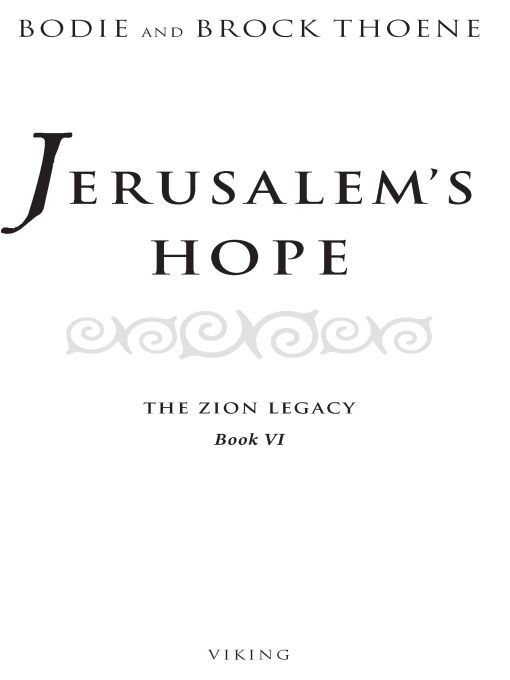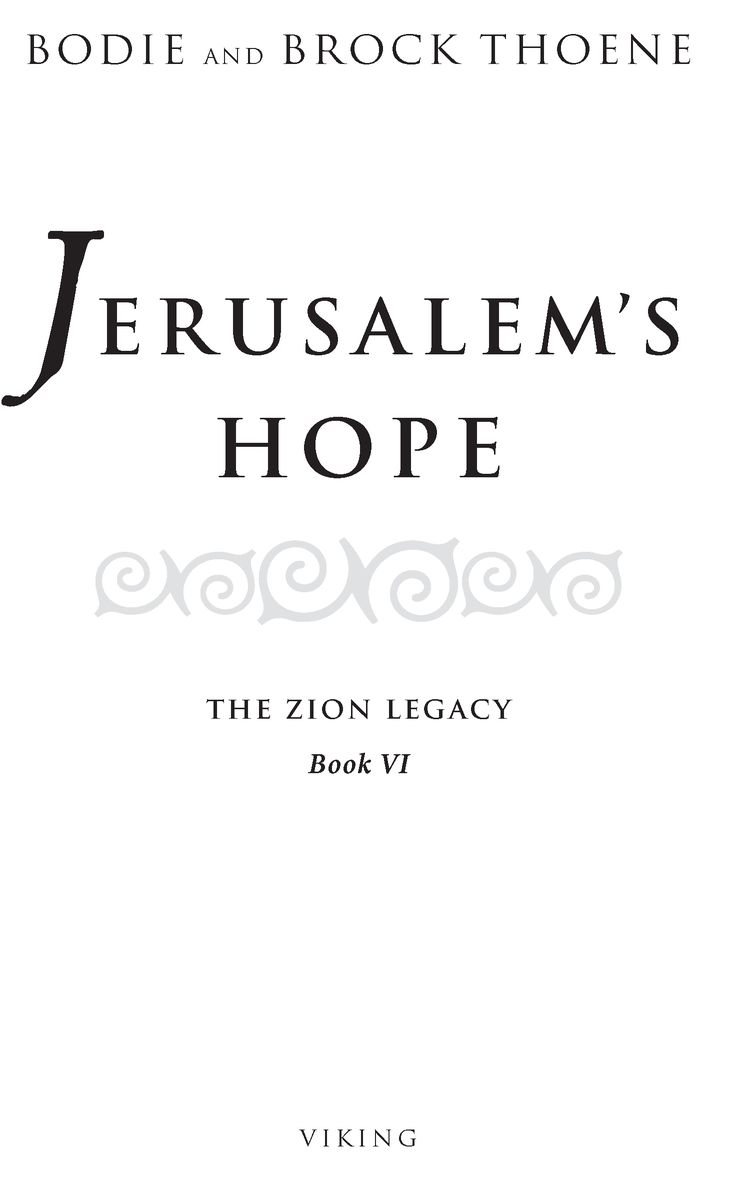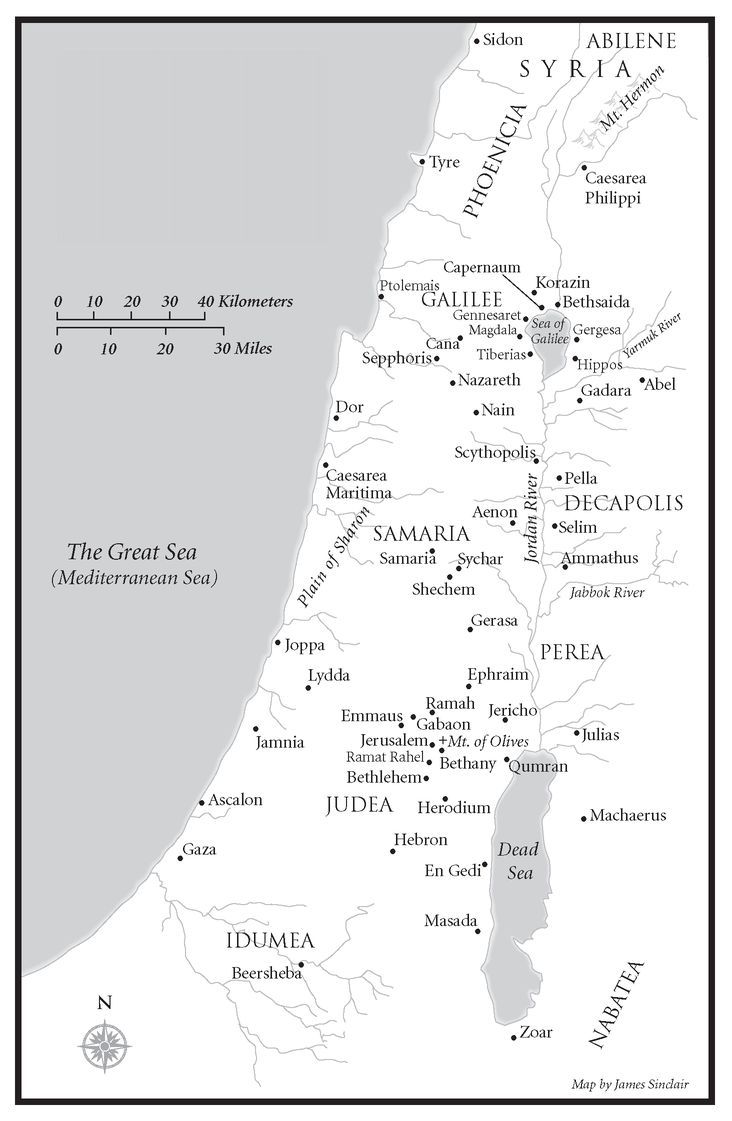Jerusalem's Hope
Authors: Brock Thoene


Table of Contents
Â
Â
Other Books by Bodie and Brock Thoene
Jerusalem Vigil
Thunder from Jerusalem
Jerusalem's Heart
The Jerusalem Scrolls
Stones of Jerusalem
Shiloh Autumn
The Twilight of Courage
The Zion Covenant Series
The Zion Chronicles Series
The Shiloh Legacy Series
The Saga of the Sierras
The Galway Chronicles
The Wayward Wind Series
Thunder from Jerusalem
Jerusalem's Heart
The Jerusalem Scrolls
Stones of Jerusalem
Shiloh Autumn
The Twilight of Courage
The Zion Covenant Series
The Zion Chronicles Series
The Shiloh Legacy Series
The Saga of the Sierras
The Galway Chronicles
The Wayward Wind Series

VIKING
Published by the Penguin Group
Penguin Putnam Inc., 375 Hudson Street,
New York, New York 10014, U.S.A.
Penguin Books Ltd, 80 Strand, London WC2R 0RL, England
Penguin Books Australia Ltd, 250 Camberwell Road, Camberwell, Victoria 3124, Australia
Penguin Books Canada Ltd, 10 Alcorn Avenue, Toronto, Ontario, Canada M4V 3B2
Penguin Books India (P) Ltd, 11 Community Centre, Panchsheel Park, New Delhi-110 017, India
Penguin Books (N.Z.) Ltd, Cnr Rosedale and Airborne Roads, Albany,
Auckland, New Zealand
Penguin Books (South Africa) (Pty) Ltd, 24 Sturdee Avenue,
Rosebank, Johannesburg 2196, South Africa
Published by the Penguin Group
Penguin Putnam Inc., 375 Hudson Street,
New York, New York 10014, U.S.A.
Penguin Books Ltd, 80 Strand, London WC2R 0RL, England
Penguin Books Australia Ltd, 250 Camberwell Road, Camberwell, Victoria 3124, Australia
Penguin Books Canada Ltd, 10 Alcorn Avenue, Toronto, Ontario, Canada M4V 3B2
Penguin Books India (P) Ltd, 11 Community Centre, Panchsheel Park, New Delhi-110 017, India
Penguin Books (N.Z.) Ltd, Cnr Rosedale and Airborne Roads, Albany,
Auckland, New Zealand
Penguin Books (South Africa) (Pty) Ltd, 24 Sturdee Avenue,
Rosebank, Johannesburg 2196, South Africa
Â
Penguin Books Ltd, Registered Offices:
Harmondsworth, Middlesex, England
Harmondsworth, Middlesex, England
Â
Â
Â
Copyright © Brock Thoene and Bodie Thoene, 2002All rights reserved.
Â
Map illustration by James Sinclair
Â
Excerpts from
The Holy Bible, New International Version
. Copyright © 1973, 1978, 1984 by International Bible Society. Used by permission of Zondervan Publishing House. All rights reserved.
The Holy Bible, New International Version
. Copyright © 1973, 1978, 1984 by International Bible Society. Used by permission of Zondervan Publishing House. All rights reserved.
Â
PUBLISHER'S NOTE
This is a work of fiction. Names, characters, places, and incidents either are the product of
the author's imagination or are used fictitiously, and any resemblance to actual persons, liv
ing or dead, business establishments, events, or locales is entirely coincidental.
This is a work of fiction. Names, characters, places, and incidents either are the product of
the author's imagination or are used fictitiously, and any resemblance to actual persons, liv
ing or dead, business establishments, events, or locales is entirely coincidental.
Â
LIBRARY OF CONGRESS CATALOGING-IN-PUBLICATION DATA
Thoene, Bodie, 1951-
Jerusalem's hope / Bodie and Brock Thoene.
p. cm.â(The Zion legacy ; bk. 6)
Thoene, Bodie, 1951-
Jerusalem's hope / Bodie and Brock Thoene.
p. cm.â(The Zion legacy ; bk. 6)
eISBN : 978-1-101-17685-6
1. IsraelâHistoryâ1948-1967âFiction. 2. JewsâHistoryâ20th centuryâ
Fiction. 3. Israel-Arab War, 1948-1949âFiction. 4. JerusalemâFiction.
I. Thoene, Brock, 1952- II. Title.
PS3570.H46 J496 2002
813'.54âdc21 2002022959
Fiction. 3. Israel-Arab War, 1948-1949âFiction. 4. JerusalemâFiction.
I. Thoene, Brock, 1952- II. Title.
PS3570.H46 J496 2002
813'.54âdc21 2002022959
Â
This book is printed on acid-free paper.


Â
Â
Â
Without limiting the rights under copyright reserved above, no part of this publication may be reproduced, stored in or introduced into a retrieval system, or transmitted, in any form or by any means (electronic, mechanical, photocopying, recording or otherwise), without the prior written permission of both the copyright owner and the above publisher of this book.
With love to our brother,
Rick Christian,
who has the heart of a shepherd
Rick Christian,
who has the heart of a shepherd
JUDEA
IN THE TIME
OF JESUS
IN THE TIME
OF JESUS

PROLOGUE
Friday, May 28, 1948
T
he plume of smoke rising from the Jewish Quarter of the Old City of Jerusalem obscured the stars and moon as Rachel Sachar and her younger brother, Yacov, returned to Grandfather's grave.
he plume of smoke rising from the Jewish Quarter of the Old City of Jerusalem obscured the stars and moon as Rachel Sachar and her younger brother, Yacov, returned to Grandfather's grave.
There were no tears left to cry. In silence the mourners stood in the garden of the Russian compound outside the ancient walls.
Rachel slid her arm around Yacov's frail shoulders. Together they recited
kaddish
. Rachel raised her eyes as the bloodred moon broke through the fumes for an instant and then vanished. It was, she thought, like Warsaw had been during the last days in the Ghetto. Burials had been conducted clandestinely at night because it was against Nazi edicts for anyone to gather together openly.
kaddish
. Rachel raised her eyes as the bloodred moon broke through the fumes for an instant and then vanished. It was, she thought, like Warsaw had been during the last days in the Ghetto. Burials had been conducted clandestinely at night because it was against Nazi edicts for anyone to gather together openly.
The Third Reich had surrendered less than three years earlier, and yet Jews in the newly reborn nation of Israel were still burying their dead under cover of darkness.
Savage armies still surrounded the Jewish people, and Arab leaders vowed openly to the world, “We will finish what Hitler began. . . . We will drive the Jews into the sea!”
Would the hatred against the children of Israel never end?
Tonight the red-haired British major, Luke Thomas, warned Jewish civilian refugees in the compound, “Funerals after dark, please. No use risking more killed.”
From across the blacked-out buildings of No Man's Land came the strident cry of a fighter for the Islamic Jihad,
“Allah Ahkbar! There is no god but Allah, and Mohammed is his prophet!”
“Allah Ahkbar! There is no god but Allah, and Mohammed is his prophet!”
It was a strange irony, Rachel thought as she heard it, that this declaration, the foundation of Islam, mocked and taunted the ears of Jewish survivors. In the Arabic language
Allah
was the name of the god of Islam. But when spoken in Hebrew it meant something entirely different. In the writings of Torah the Hebrew word spelled,
alef, lamed, heh
was also pronounced
allah,
but it meant, “to curse, to lie, to lament!”
Allah
was the name of the god of Islam. But when spoken in Hebrew it meant something entirely different. In the writings of Torah the Hebrew word spelled,
alef, lamed, heh
was also pronounced
allah,
but it meant, “to curse, to lie, to lament!”
Indeed a terrible lament followed the rabbis, Yeshiva students, women, and children as they fled from their ancestral home in the shadow of the Western Wall.
Arab snipers bloomed thick and fierce on the Old City parapets now that the Jewish population had been driven out. There were no Haganah defenders left to prevent the Jihad Moquades from firing down at will upon civilians in Jewish-held West Jerusalem.
Though mere hours had passed since that tragic defeat, it had dawned upon the people that perhaps they would never again walk the streets of Jerusalem as their ancestors had done. The newest conquerorsâmen from Iraq, Syria, Egypt, and Jordanâdeclared to their people that Jewish exile from the holy place of El Kuds was permanent and irrevocable.
The grief at this realization was as tangible as death.
Ten-year-old Yacov shuddered and reached up to clasp Rachel's hand.
Rachel's blue eyes clouded as she thought of her father and mother in Poland. She remembered her father standing before his congregation on that last Passover before the fall of Warsaw. What words had he offered to give them courage and hope?
She cleared her throat and began haltingly. “I know what Grandfather would want me to say. Not
about
him only but
for
him . . . So many now . . . dying all around us for the sake of HaShem. For Eretz-Israel. For the promise and the hope our people have clung to for generations.” She bit her lip and thought of her husband, Moshe, far beneath the mount where the Great Temple of the Lord had once stood. When would she see Moshe again? When would the people of Israel once more stand before the Western Wall and offer their praise to the Almighty? “I won't use my own words. But my father and grandfatherâindeed, every Jew I knew as a child growing upâhad a saying that gave us hope, even in the darkest time. They died with this hope on their lips.” She proclaimed in Hebrew, “â
Ha lahma anya. . . .
This year we are slaves! Next year we will be free! This year we are here . . . next year, in Jerusalem!' ”
about
him only but
for
him . . . So many now . . . dying all around us for the sake of HaShem. For Eretz-Israel. For the promise and the hope our people have clung to for generations.” She bit her lip and thought of her husband, Moshe, far beneath the mount where the Great Temple of the Lord had once stood. When would she see Moshe again? When would the people of Israel once more stand before the Western Wall and offer their praise to the Almighty? “I won't use my own words. But my father and grandfatherâindeed, every Jew I knew as a child growing upâhad a saying that gave us hope, even in the darkest time. They died with this hope on their lips.” She proclaimed in Hebrew, “â
Ha lahma anya. . . .
This year we are slaves! Next year we will be free! This year we are here . . . next year, in Jerusalem!' ”

What day was it? Moshe Sachar wondered as he replaced the scroll in its alabaster container. How long had he and Alfie Halder been beneath the Temple Mount, hidden away in the sacred archives of Israel?
Moshe's watch had long since stopped. He and his companion slept and awakened, ate from the vast storehouse, bathed in the
mikveh,
sang, prayed, and remembered the world they had left behind at Grandfather Lebowitz's urging. They studied beneath the arch of the glowing universe painted on the stones of the chamber.
mikveh,
sang, prayed, and remembered the world they had left behind at Grandfather Lebowitz's urging. They studied beneath the arch of the glowing universe painted on the stones of the chamber.
All that and yet they could not tell if it was daylight or dark. And now Moshe was no longer sure of the day or the hour. Was Rachel well? Was Israel still in existence? Who ruled in Jerusalem?
When Rabbi Lebowitz had first showed Moshe the secret tunnels beneath the Temple Mount, he had commanded that Moshe, a former professor turned Haganah defender, must learn to tell the time if he was to survive as guardian of the precious archives. Moshe had failed as a timekeeper.
Other books
The Emperor of All Maladies: A Biography of Cancer by Siddhartha Mukherjee
The Blackbirder by Dorothy B. Hughes
Reclaim: A Recovered Innocence Novel by Beth Yarnall
Wildflower by Prudence MacLeod
Internecine by David J. Schow
Love is for Ever by Barbara Rowan
Bad Marie by Dermansky, Marcy
Saved by the Monarch by Marton, Dana
The Promise by TJ Bennett
My Butterfly by Laura Miller
